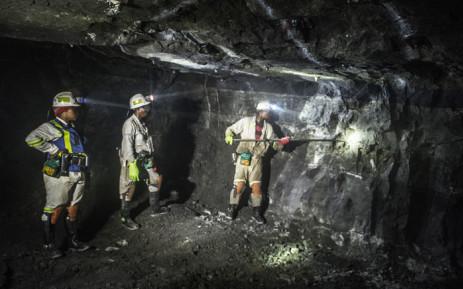Amplats Reinstates Dismissed Workers Due to Trade Union Struggle

Platinum workers in a mine in South Africa. File Photo (AFP)
All the 947 workers dismissed for going on strike by the mining giant Anglo American Platinum (Amplats) at its Mototolo Mine in Limpopo province of South Africa, have been reinstated. Under the pressure of the sustained industrial action, the company also withdrew the court case through which it was intending to sue the workers’ union for loss of production during the period of the strike.
The company also met all of the demands that the workers put forth during their strike action which began on May 13. Following this, the strike was lifted and on May 31 the workers returned to work at the mine.
The strike action, led by General Industrial Workers of South Africa (GIWUSA), began after the company unilaterally imposed changes to the conditions of employment set out in the contract.
Amplats, which controls 40% of the world’s Platinum supply, bought the Mototolo mine from its competitor, Glencore, in November of last year. According to the Labour Relations Act of South Africa, because the company bought the mine as a ‘going concern’, it is obliged to comply with the contract under which the workers were employed by the previous owner.
However, the company unilaterally brought about a number of changes to the conditions of employment. For example, they changed the medical aid package the workers had and the new package, unlike the one that was scrapped, did not cover the children of the workers.
The workers refused to accept these unilateral changes from the company and demanded that Amplats maintains all the conditions of employment it had negotiated in the contract with the previous employer. Alternately, if Amplats wanted to make changes, the workers demanded that the proper procedure had to be followed.
This would have required the company to terminate the existing contract and pay all the benefits, such as the provident fund for example, that the workers had accumulated over the period for which they worked under the this contract. Following this, the company would have to negotiate a new contract with the union.
After Amplats refused both of these options and went ahead with making unilateral changes, GIWUSA served a strike notice on May 9. The company quickly moved to court and the union was issued a summons at 11 a.m the next morning, and asked to present themselves in court by 2 p.m, giving the union less than three hours to prepare. Additionally, the summons notice was sent to the local office of the union in Limpopo, and not to the head office in Germiston which is able to move its legal team.
In absence of the union’s representatives in the courtroom, the court granted the company an interdict against the strike. However, defying the interdict, the workers embarked on the strike on May 13, following which, the company fired 947 workers, amounting to around half the workforce laboring the mine.
Despite the dismissals, the industrial action sustained, and began to take a toll on production, as evident in the company’s attempt to sue the union for loss of production. Under this pressure, the company had a series of meetings with the union leaders.
On May 23 and 24 they met with the Deputy General Secretary of GIWUSA, Charles Phahla, and on the 27th and the 28th they met with Zwelinzima Vavi, the General Secretary of South African Federation of Trade Unions (SAFTU), to which the union is affiliated.
Finally, the company agreed to reinstate all the workers and maintain the conditions of employment, including the medical aid package, as it was under the previous contract the union had negotiated with Glencore. Following this victory, the strike was ended and the workers have returned to their posts.
However, due to the interdict of the court, the strike was “unprotected”, as a result of which the workers will suffer a loss of pay for the strike period.
Nevertheless, this “victory of the workers”, GIWUSA’s statement read, “is a testimony to the power of the unity, organization and determination to fight the brutal class agenda of the bosses to restructure the mining industry to offload the crisis of the industry on the shoulders of the Mine workers. It is also a call for the trade union movement to build an organized resistance.”
Get the latest reports & analysis with people's perspective on Protests, movements & deep analytical videos, discussions of the current affairs in your Telegram app. Subscribe to NewsClick's Telegram channel & get Real-Time updates on stories, as they get published on our website.
























